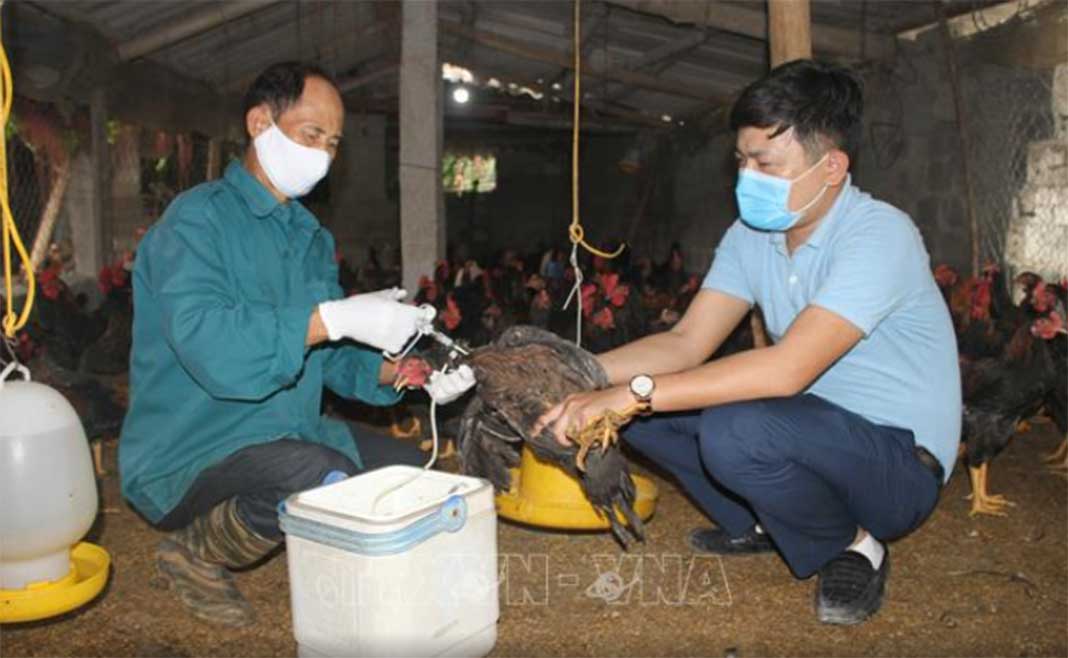HCMC – The Ministry of Agriculture and Rural Development has issued a dispatch boosting urging the inspection of poultry and poultry product imports into Vietnam to prevent the spread of the influenza A virus subtype H5N1 (A/H5N1).
In the dispatch sent to the agriculture departments of localities and the Department of Animal Health on February 26, the ministry requested them to take measures to prevent poultry and poultry products from being illegally imported into Vietnam, causing harm to the livestock industry, food hygiene and public health.
The dispatch was issued following WHO’s warnings that the influenza A virus could be spreading after a death was reported due to A/H5N1 in Prey Veng, Cambodia, which shares a border with Vietnam.
The ministry urged the relevant ministries and provincial people’s committees to take preventive measures.
The dispatch requested provinces and cities, especially southern provinces and cities, to strengthen inspection, surveillance and control at the border gates, trails, border crossings and seaports to timely apply strict sanctions on illegal trading, slaughter and the importation of poultry and poultry products to Vietnam.
Authorities will collect samples for testing from animals and animal products which are illegally imported to the country before destroying them.
The local authorities will report their locality’s plague on the online animal disease portal and raise awareness among residents in the boundary areas over the danger of avian influenza and the consequences of trading poultry without certification.












Avian influenza, more commonly known as ‘bird flu’, is not new – in recent years outbreaks have swept across the globe with great regularity. As with all types of influenza, a respiratory virus, transmission of the A/H5N1 strain is via inhalation of infected aerosols from an individual in close proximity. We are familiar with this concept from the related strains of influenza that seasonally infect humans, as well as airborne viruses with a similar transmission route – think of those that cause the common cold or COVID-19.
Battery farming practices, in which chicken and ducks are kept in enclosed, cramped conditions, provide ideal conditions for bird-to-bird transmission. The typical ‘quick fix’ response to an outbreak is widespread culling. This has a devastating financial impact on the poultry industry, as does the knock-on effect of a reduced demand for meats and eggs from a distrusting public.
Beyond the economics, what is the risk of humans becoming infected? It’s called bird flu for a reason, right? The recent confirmed human cases of A/H5N1 in one Cambodian family, with the death of an 11-year-old girl, in Prey Veng Province bordering southern Vietnam, has understandably caused concern here. Experts from the World Health Organization are working with Cambodia’s public health authorities to determine how the family members were exposed to the virus. Most likely this was through close contact with wild or domestic birds, or possibly even a mammal – so-called zoonotic transmission. However, for the girl’s father who later became ill, was he infected by a bird or from his daughter? The usually very measured WHO acknowledges that this latter scenario raises the worrying possibility of human-to-human transmission.
For a virus to cross species boundaries to infect another animal requires it to mutate. Of course, as we know from SARS-CoV-2, respiratory viruses mutate continuously, so it is only a matter of time and misfortune before this leads to a novel strain of increased virulence. This is the random nature of the emergence of viral epidemics and pandemics. If this were to happen, the development of a seasonal flu vaccine would be tweaked so it could target the potentially pandemic pathogenic avian strain.
In the meantime, the renowned Pasteur Institute in Ho Chi Minh City has alerted southern Vietnam provinces to ramp up surveillance of viral pneumonia in both poultry and people. On a positive note, the lessons learnt from what hindsight tells us was an inadequate global outbreak detection system for the COVID-19 are now helping to ensure better epidemic preparedness for bird flu should it spread significantly to humans.
Andrew W. Taylor-Robinson
(Professor of Microbiology & Immunology, College of Health Sciences, VinUniversity, Hanoi).